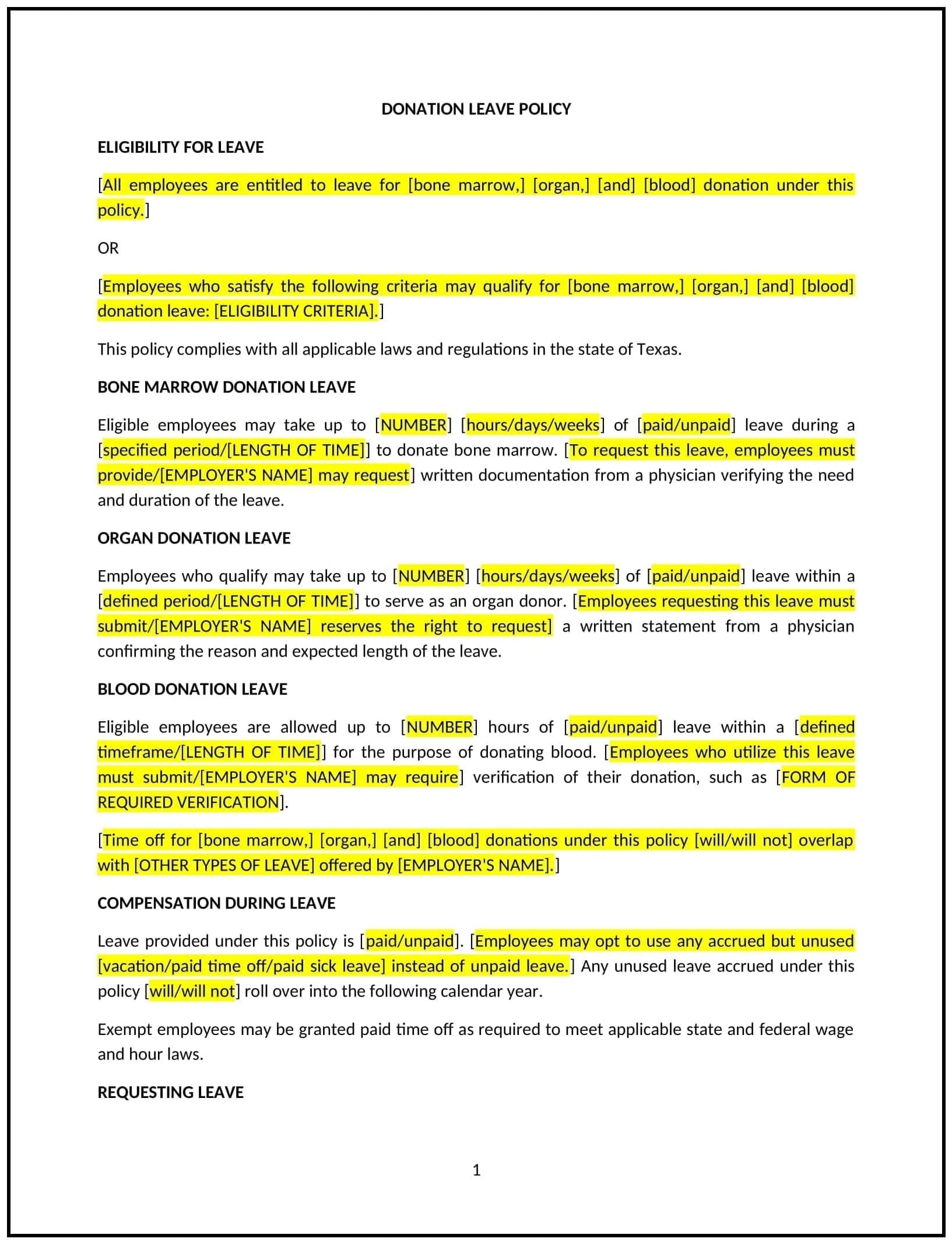Got contracts to review? While you're here for policies, let Cobrief make contract review effortless—start your free review now.

Customize this template for free
Donation leave policy (Texas)
This donation leave policy is designed to help Texas businesses establish clear guidelines for offering paid or unpaid leave to employees who wish to donate blood, bone marrow, or other bodily fluids for medical purposes or participate in charitable activities. Whether businesses are supporting employee participation in community efforts or promoting health-related donations, this template provides a structured approach to offering donation leave in a fair and compliant manner.
By adopting this template, businesses can promote corporate social responsibility, encourage employee engagement in charitable activities, and contribute to the health and well-being of the community.
How to use this donation leave policy (Texas)
- Define eligibility: Clearly specify which employees are eligible for donation leave, including full-time, part-time, or temporary employees, and any minimum tenure requirements to qualify for leave.
- Set donation leave guidelines: Outline what types of donations are covered under the policy, such as blood, bone marrow, or organ donations, and the specific amount of time off that employees can take for each type of donation.
- Address paid vs. unpaid leave: Specify whether donation leave is paid or unpaid, or if employees can use accrued paid time off (PTO) to cover the leave.
- Establish approval procedures: Detail the process employees must follow to request donation leave, including how far in advance they must request leave, who they need to notify (e.g., HR or manager), and any required documentation (e.g., donation appointment confirmation).
- Define return-to-work expectations: Clarify expectations regarding the employee’s return to work after taking donation leave, including any necessary documentation and whether they are required to return to work on the same day of donation.
Benefits of using this donation leave policy (Texas)
This policy offers several benefits for Texas businesses:
- Encourages employee engagement: Offering donation leave shows that the company values community service and employee involvement in health-related and charitable activities.
- Promotes corporate social responsibility: A donation leave policy reflects the company’s commitment to social responsibility and its role in supporting community health and well-being.
- Increases employee morale: Employees are likely to feel more engaged and loyal to a company that supports their charitable efforts, improving overall morale and job satisfaction.
- Reduces absenteeism: By allowing employees to take leave for donations, businesses may reduce the likelihood of employees taking unapproved leave or using personal time off for these activities.
- Enhances company reputation: A company that actively supports charitable activities and community health initiatives can enhance its reputation as an ethical and responsible employer.
Tips for using this donation leave policy (Texas)
- Communicate the policy clearly: Ensure all employees are aware of the donation leave policy and understand the process for requesting leave, the types of donations covered, and the amount of leave available.
- Offer flexibility: Be flexible with scheduling donation leave, allowing employees to take time off for appointments during work hours or adjust their schedules to accommodate donation activities.
- Keep records: Maintain accurate records of donation leave taken by employees, including the type of donation and the amount of leave used, to support compliance with the policy.
- Encourage participation: Promote donation opportunities and encourage employees to take part in blood drives, bone marrow donations, or other charitable activities organized by the company or local community.
- Review regularly: Update the policy as necessary to reflect changes in Texas state laws, business practices, or employee needs regarding donation leave.